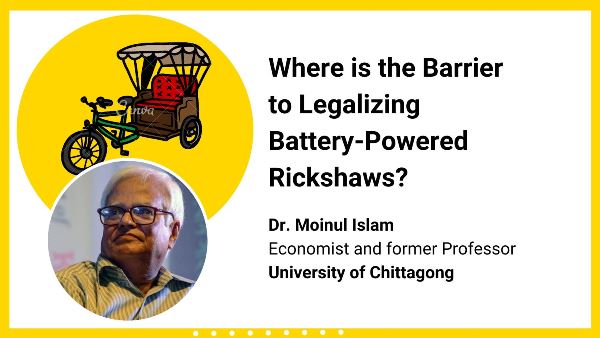What’s holding back the Legalization of Battery-Operated Rickshaws? Where is the Barrier to Legalizing Battery-Powered Rickshaws?
If The Government Intends To Promote Battery-Operated Rickshaws And Auto-Rickshaws, Why Is Their Operation Still Legally Prohibited? Is It To Protect The Interests Of Corrupt Practices Within Traffic Enforcement And Political Extortion?

What’s holding back the Legalization of Battery-Operated Rickshaws? Where is the Barrier to Legalizing Battery-Powered Rickshaws?
On February 8, 2024, in response to MP Shamim Osman’s concern over banning battery-operated auto-rickshaws and rickshaws in Parliament, State Minister for Power Nasrul Hamid stated, “I call these 4 million three-wheelers—Bangla’s Tesla.” The news was prominently covered on the second page of Prothom Alo on February 9.
For the readers’ understanding, Tesla is the most popular electric vehicle in the United States, leading the shift in the Western world towards eliminating fossil fuel-based vehicles.
Nasrul Hamid further mentioned that there is a global revolution aimed at transitioning the transport system to electric as quickly as possible. The efficiency of fuel-driven engines is only 20%, while electric engines boast 80% efficiency.
He added, “We are not obstructing them. Mechanically, there might be faults. But the return on the electricity used is much higher. We are working on a project for them to transition from lead batteries to lithium batteries. We will provide lithium batteries to replace lead batteries.”
If the government is keen to encourage the widespread use of battery-operated rickshaws and auto-rickshaws, why are these vehicles still considered ‘legally illegal’?
Nasrul Hamid expressed that public transport should be transitioned to electric as soon as possible, citing cost-efficiency and environmental benefits. His remarks indicate that while these vehicles may currently be illegal, the government is adopting a policy to promote their use.
In This Context, My Question Is: If The Government Intends To Promote Battery-Operated Rickshaws And Auto-Rickshaws, Why Is Their Operation Still Legally Prohibited? Is It To Protect The Interests Of Corrupt Practices Within Traffic Enforcement And Political Extortion?
Battery-operated rickshaws and auto-rickshaws have been present in the country for nearly a decade. In rural and semi-urban areas, they are steadily replacing traditional cycle rickshaws. The use of battery-operated auto-rickshaws has also grown over the years as they are more cost-effective than CNG auto-rickshaws for short-distance travel in Bangladesh. In many places, traditional cycle rickshaws are becoming a rarity.
These vehicles have become the primary mode of transport in many areas, a change that I consider a welcome modernization and environmentally friendly alternative. Although some criticize them as mechanically faulty and hazardous, there has been no significant rise in accidents reported in areas where these vehicles are common. The issue of mechanical flaws should not be ignored, but it hasn’t posed a significant concern for battery-operated auto-rickshaws.
While sudden braking may pose a risk, such incidents are not frequent enough to deter users. If it were a severe problem, users would have already shown reluctance in using them. However, like cycle rickshaws, their use should not be legalized on highways for understandable reasons.
I see no reason to discourage this employment opportunity for the marginalized population that reduces physical strain. I urge the government to draft clear legislation that grants legal status for battery-operated rickshaws and auto-rickshaws on rural roads and smaller city streets, while maintaining a ban on their use on national highways and major city roads.
Shamim Osman pointed out the illegal use of electricity for charging these rickshaws, which is a valid concern. Using 700–800 MW of power illegally is not a trivial matter. In response, Nasrul Hamid outlined steps to encourage the legal use of electricity. I urge him to prioritize and expedite these government projects, especially transitioning from lead to lithium batteries.
China has been successful in competing with developed nations in expanding solar power use, but Bangladesh has yet to achieve significant success in renewable energy. According to Nasrul Hamid’s statement in Parliament on February 8, 2024, only 459 MW (2%) of solar power is connected to the national grid. As of November 2023, only 1,195 MW of power was being generated from all renewable sources combined. This shortfall is unacceptable. The country’s reliance on mega projects for coal-based power has become an unsustainable burden, and dependence on imported LNG has already placed the power sector in peril.
The Sustainable and Renewable Energy Development Authority has recommended a target of 30,000 MW of solar power, including 12,000 MW from rooftop solar panels.
Producing 12,000 MW from rooftop solar is achievable, provided subsidies for solar panels and batteries are implemented, tariffs on solar equipment are reduced, and an effective ‘Net Metering’ system is introduced.
Dr. Moinul Islam is an economist and former professor of economics at Chittagong University. Based on Prothom Alo; Translated by Consumer News Today.




